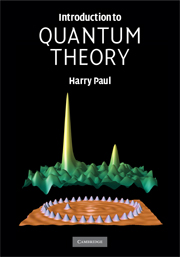9 - Macroscopic quantum effects
Published online by Cambridge University Press: 04 June 2010
Summary
Quantum mechanics casts its shadows before it
It might be felt amazing that quantum effects show up in our macroscopic world. We know miraculous phenomena such as superconductivity, for instance, which classical physics is basically unable to explain. This makes it impossible to separate nicely the microcosm from the macroscopic world through a clear-cut borderline, or a more or less well defined transition region at least. It should be noticed that classical physics, notably statistical thermodynamics, in certain cases already runs into trouble in what should be its domain of validity. This became obvious from observations, mostly at low temperatures, that manifestly differed from basic classical predictions.
Those discrepancies were found, above all, in thermodynamics. In particular, the specific heat capacity of materials with decreasing temperature did not obey the rule that followed from classical (i.e., Boltzmann) statistics. This rule states that the energy can be calculated by assigning to any constituent the average energy kT/2 (k Boltzmann constant) per degree of motional freedom. (In the case of vibrations the potential energy gives rise to an extra contribution kT/2.) For instance, in an ideal gas formed from atoms, any atom has three translational degrees of freedom. Hence each atom contributes the energy 3kT/2, and we simply get the total energy of the sample on multiplication of this figure by the number of atoms. When the constituents of a gas are molecules, additional rotational and vibrational degrees of freedom come into play, which further enhance the average energy of a molecule.
- Type
- Chapter
- Information
- Introduction to Quantum Theory , pp. 144 - 158Publisher: Cambridge University PressPrint publication year: 2008



